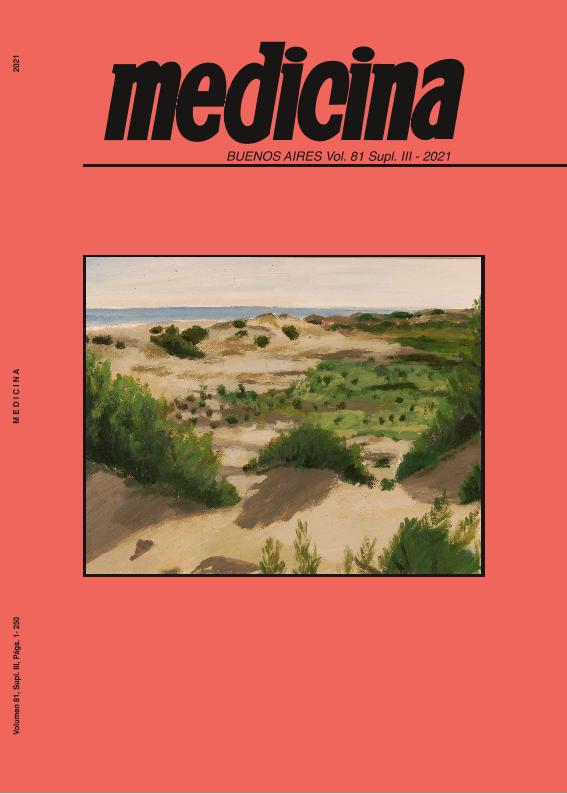Evento
Dendritic cell profile in tumoral microenvironment of human breast carcinomas
Garcia Samartino, Clara ; Vaquer, Cintia Celina
; Vaquer, Cintia Celina ; Militello, Rodrigo Damián
; Militello, Rodrigo Damián ; Santoni, Diego; Sarrio, Leandro; Cebrián, José Ignacio
; Santoni, Diego; Sarrio, Leandro; Cebrián, José Ignacio ; Campoy, Emanuel Martin
; Campoy, Emanuel Martin
 ; Vaquer, Cintia Celina
; Vaquer, Cintia Celina ; Militello, Rodrigo Damián
; Militello, Rodrigo Damián ; Santoni, Diego; Sarrio, Leandro; Cebrián, José Ignacio
; Santoni, Diego; Sarrio, Leandro; Cebrián, José Ignacio ; Campoy, Emanuel Martin
; Campoy, Emanuel Martin
Colaboradores:
Curino, Alejandro Carlos ; Maccioni, Mariana
; Maccioni, Mariana ; Shaiquevich, Paula; Duran, Hebe Alicia
; Shaiquevich, Paula; Duran, Hebe Alicia
 ; Maccioni, Mariana
; Maccioni, Mariana ; Shaiquevich, Paula; Duran, Hebe Alicia
; Shaiquevich, Paula; Duran, Hebe Alicia
Tipo del evento:
Reunión
Nombre del evento:
Reunión de Sociedades De Biociencias 2021;LXVI Reunión Anual de la Sociedad Argentina De Investigació Clínica; LXIX Reunión Anual de la Sociedad Argentina de Inmunología; LIII Reunió Anual de La Asociación Argentina de Farmacología Experimental; XI Reunión Anual De La Asociación Argentina de Nanomedicinas
Fecha del evento:
17/11/2021
Institución Organizadora:
Sociedad Argentina de Investigación Clínica;
Sociedad Argentina de Inmunología;
Asociación Argentina de Farmacología Experimental;
Asociación Argentina de Nanomedicinas;
Título de la revista:
Medicina (Buenos Aires)
Editorial:
Fundación Revista Medicina
ISSN:
0025-7680
e-ISSN:
1669-9106
Idioma:
Inglés
Clasificación temática:
Resumen
Argentina has the second-highest mortality rate for breast cancer (BC) in South America. The immune cells present in the tumor microenvironment (TME) perform dual functions, being able to eliminate or promote malignancy according to the signals present. We believe that the dendritic cells (DCs) found in the TME play a fundamental role in the development of the mammary tumor. Our hypothesis is that there are different subpopulations and maturation profiles of DCs in the TME, and these profiles are associated with tumor traits of mammary carcinomas. Initially, we propose as a general objective to study the different types of DCs present in the TME and to determine the profile of these different subtypes in human breast carcinomas. Methodology: Once the tumors were obtained by surgery, breast carcinoma-derived fractions were mechanically and enzymatically disaggregated. Tumoral (EpCAM+) and non-tumoral (EpCAM-) populations of each fraction were isolated using cell sorting flow cytometry. DC populations were characterized by flow cytometry using the HLA-DR, CD14, CD11c, CD1c cell surface markers to perform the gating strategy. Results: We obtained tumoral and non-tumoral populations derived from eight human breast carcinomas fractions. We defined four different DC subpopulations present in the TME: pDCs, inflammatory DCs, cCD1 and cCD2 DCs. Interestingly, we observed that each tumoral fraction has a unique DC profile, according to the high heterogeneity already described for this type of tumor. Based on the tumor cohort analysis, we evidenced a negative correlation between tumor cells and cDC2 DC populations (r= -0.76, p<0.027). Conclusion: Breast TME contains different DC profiles associated with tumoral cell proportions in human breast carcinoma fractions. Ongoing and future experiments will allow us to determine the maturation profiles of these DCs and analyze their relationship with genomic/epigenomic and clinicopathological tumor characteristics.
Palabras clave:
DENDRITIC CELLS
,
BREAST CANCER
,
TUMOR MICROENVIRONMENT
,
FLOW CYTOMETRY
Archivos asociados
Licencia
Identificadores
Colecciones
Eventos(IHEM)
Eventos de INST. HISTOLOGIA Y EMBRIOLOGIA DE MEND DR.M.BURGOS
Eventos de INST. HISTOLOGIA Y EMBRIOLOGIA DE MEND DR.M.BURGOS
Citación
Dendritic cell profile in tumoral microenvironment of human breast carcinomas; Reunión de Sociedades De Biociencias 2021;LXVI Reunión Anual de la Sociedad Argentina De Investigació Clínica; LXIX Reunión Anual de la Sociedad Argentina de Inmunología; LIII Reunió Anual de La Asociación Argentina de Farmacología Experimental; XI Reunión Anual De La Asociación Argentina de Nanomedicinas; Ciudad Autónoma de Buenos Aires; Argentina; 2021; 222-222
Compartir



